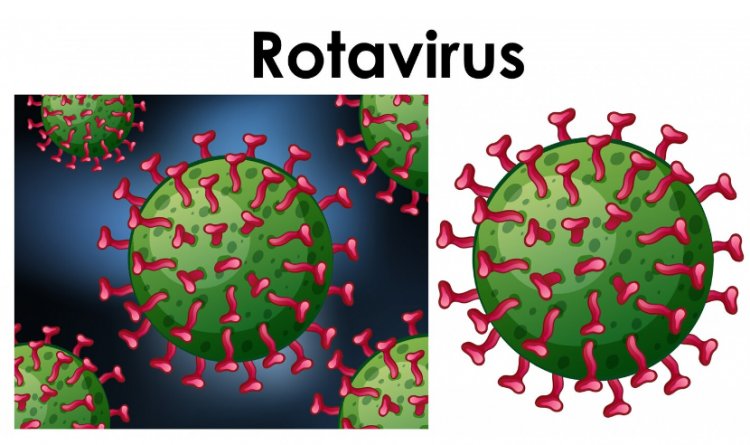Rota Virus: What is it, How it Spreads, Symptoms, Treatment
Rota virus, a highly contagious virus belonging to the Reoviridae family, is a leading cause of severe diarrhea among infants and young children globally. This virus is particularly prevalent in developing countries where sanitation and hygiene conditions are suboptimal. Understanding the nature of the virus, its mode of transmission, symptoms, and available treatments is crucial for effective management and prevention.

What is Rota Virus?
Rota virus is a double-stranded RNA virus that primarily infects the intestinal lining, leading to gastroenteritis. It is the most common cause of severe diarrhea among infants and young children worldwide. The virus is named after its wheel-like (rota is Latin for "wheel") appearance when viewed under an electron microscope due to the arrangement of its outer protein shell.
How Does Rota Virus Spread?
Rota virus spreads primarily through the fecal-oral route, often via contaminated food, water, or surfaces. Infected individuals shed the virus in their stool, which can contaminate the environment and infect others through ingestion. The virus can also spread through respiratory droplets and close personal contact with an infected individual. Additionally, Rota virus outbreaks are common in settings such as daycare centers and hospitals where close contact among children facilitates transmission.
Symptoms of Rota Virus Infection
The incubation period for Rota virus infection is typically 1 to 3 days. Infected individuals, especially infants and young children, may experience a range of symptoms, including:
- Severe Diarrhea: Watery diarrhea is the hallmark symptom of Rota virus infection. The diarrhea can be profuse and lead to dehydration, particularly in infants and young children.
- Vomiting: Many individuals infected with Rota virus also experience vomiting, which can exacerbate dehydration.
- Fever: Fever is common during Rota virus infection, although not all individuals develop a fever.
- Abdominal Pain: Some individuals may experience abdominal cramps or discomfort.
- Irritability: Infants and young children infected with Rota virus may appear unusually irritable or lethargic.
In severe cases, Rota virus infection can lead to dehydration, electrolyte imbalances, and even death, especially in young children and immunocompromised individuals.
Treatment and Management
There is no specific antiviral treatment for Rota virus infection. Management primarily focuses on supportive care to alleviate symptoms and prevent dehydration. This includes:
- Fluid Replacement: Oral rehydration solution (ORS) containing electrolytes and glucose is the cornerstone of treatment for Rota virus-induced dehydration. In severe cases, intravenous fluids may be necessary.
- Nutritional Support: Maintaining adequate nutrition is important, especially in children who may experience decreased appetite during illness.
- Symptomatic Relief: Over-the-counter medications such as acetaminophen may be used to reduce fever and discomfort. Antiemetics may be prescribed to alleviate vomiting.
Preventing Rota virus infection relies on good hygiene practices and vaccination. Key preventive measures include:
- Hand Hygiene: Regular handwashing with soap and water, especially after using the toilet and before eating or preparing food, can help prevent Rota virus transmission.
- Safe Food and Water: Consuming safe, properly cooked food and clean drinking water can reduce the risk of ingesting the virus.
- Vaccination: Vaccination against Rota virus is recommended for infants as part of routine childhood immunization programs in many countries. The vaccine has been shown to significantly reduce the incidence and severity of Rota virus gastroenteritis.
In conclusion, Rota virus is a common and potentially serious viral infection that primarily affects infants and young children. Understanding its mode of transmission, symptoms, and available treatment and prevention strategies is essential for effective management and control of the disease.
#RotaVirus #Diarrhea #Gastroenteritis #ChildhoodInfections #ViralOutbreaks #InfantHealth #ContagiousDiseases #PediatricIllness #Healthcare #VirusPrevention #HygienePractices #Vaccination #ChildCare #MedicalKnowledge #PublicHealth #StayHealthy #HealthAwareness #ParentingTips #InfectiousDiseases #HealthEducation #PreventiveMedicine
Disclaimer:
The information provided in this article is for educational purposes only and should not be considered medical advice. If you have any health concerns or are experiencing symptoms, it is important to consult with a healthcare professional, such as a doctor or clinic, for proper diagnosis and treatment. Always seek the advice of your doctor or other qualified health provider with any questions you may have regarding a medical condition. Do not disregard professional medical advice or delay in seeking it because of something you have read in this article.
What's Your Reaction?





















